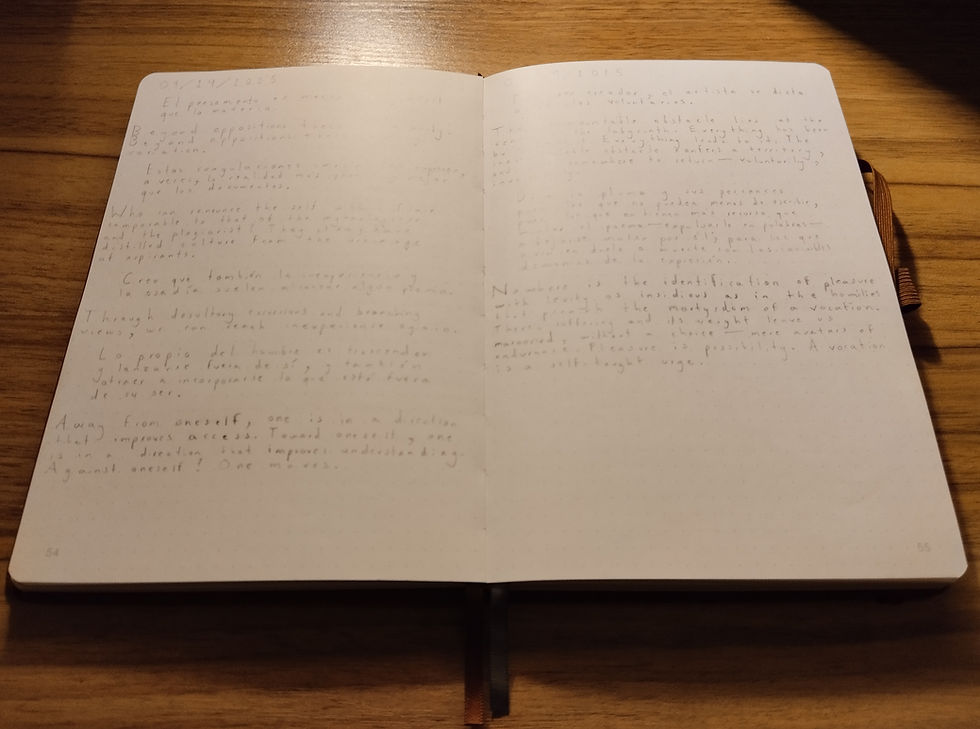The Double Voice: On Maria Wutz and Sartor Resartus
- Israel Bonilla
- Dec 12, 2021
- 4 min read
Updated: Jan 2

In Carlyle's Sartor Resartus, a world-weary editor grapples with the manuscript remains of an eccentric professor. Slowly, he unearths an idealistic creed, the “Philosophy of Clothes,” product of a fascinating amalgam of diverse German thinkers—Kant, Goethe, Fichte, Novalis. Carlyle's procedure is frenzied: a metaphysical treatise becomes a comedy of manners becomes a bildungsroman becomes a sociological critique becomes a mystic vision. Moreover, the editorial comment, always ironic, is a source of unremitting tension. But before Carlyle there was Richter.
Just as the digressive fits and erudite legerdemain of Rabelais altered the stylistic course of Sterne, so too Richter’s metaphysical and metafictional excesses altered Carlyle’s approach to fiction. He wrote in 1827: “Richter’s works do not always bear sufficient marks of having been in fusion; yet neither are they merely riveted together; to say the least, they have been welded.” And again in 1830: “Richter is by no means a man whose merits, like his singularities, force themselves on the general eye; indeed, without great patience, and some considerable catholicism of disposition, no reader is likely to prosper much with him.” Carlyle could have easily been describing the method of Sartor Resartus. To be sure, the parallels in technique are nowhere as striking as in the “episode” Richter appended to The Invisible Lodge, his first novel: Life of the Cheerful Little Schoolmaster Maria Wutz in Auenthal.
Maria Wutz is the story of a modest schoolmaster told through the cosmopolitan perspective of a “book-maker.” Whereas Carlyle is fundamentally interested in the philosophical underpinnings of his romantic hero, Richter cannot detach from life itself—his digressions, meditations, and jokes all underscore what it is to exist as a soul embodied amid a magnanimous creation. Wutz does not brood, Wutz does not complain, Wutz simply dreams. To him, the past is never lost and the future is never beyond grasp:
All day long he was in a state of enjoyment, either present or prospective. “Before I get up,” said he, “I rejoice in anticipation of breakfast; all the morning I look forward to dinner; at vesper-time to my piece of vesper-bread, and in the evening to the evening crust, and thus alumnus Wutz always has something to hope for.” When he took a deep draught of water, he would say, “That was glorious, Wutz,” and stroked his waistcoat. When he sneezed, he said, “God bless thee, Wutz.” In the biting November frost, he would comfort himself out of doors by picturing the warm stove, and thrusting each hand in turn under his cloak.
Richter's narrator, unlike Carlyle's, has no interest in reprimanding his subject. The treatment is gentle and admiring, with few mock admonishments. He knows he is in the presence of a blessed being:
Oh, if greater souls than thine could suck as much sweetness and fragrance out of the entire flower-garden of nature as thou did’st out of the one prickly green leaf on which Fate had hung thee, they would feast on gardens, not on leaves, and these better and yet happier souls would no longer wonder at the existence of contented Dominies!
He also foregoes constant quotation. Thus the image of Wutz that materializes retains the polish of surface and is consonant with an early observation regarding his experience: "Verily, thou, dear Wutz, mayest write the Joys of Werther, for thy outer and thy inner world are always soldered together like the two halves of a shell, and enclose thee as their oyster."
All in all, Maria Wutz appears a sincere and almost sentimental counterpart to the explosive Sartor Resartus. Yet the peculiar tension upon which Richter plays is that between life for Wutz and life for the rest. The former constantly nurtures rhapsody; the latter, lamentations in the key of Ecclesiastes:
But why, I ask, does this schoolmaster’s happy heart afford so much joy to me, and perhaps to you also? Alas! it is perhaps because we ourselves never get such a full measure of it; because the thought of the vanity of earthly things lies heavy on us and oppresses our breath, because we have already seen the black churchyard mould underneath that flowery sward on which the little schoolmaster is frisking his life away.
The contrast, nevertheless, persists. In the first volume of Main Currents in Nineteenth Century Literature, Brandes speaks of the differing Romantic types of Werther, who is trapped in “the vague unrest of anticipation,” a son of prerevolutionary times, and René, who wallows in mere disillusionment, an orphan of postrevolution. Wutz and Teufelsdröckh fit this classification insofar as they push it to an extreme, for the unrest of Wutz is the unrest of an overjoyed spirit who knows his dwelling-place a continuum, while the disillusionment of Teufelsdröckh is the disillusionment of a misanthrope who must resist fragmentation. There is the further intricacy of metafictional conceit. Though Richter’s book-maker is less mercurial than Carlyle’s editor, both are eminently reasonable. The divergence lies deeper.
Most genuine works of art have a question as their anchorage—vision presupposes an understanding of what is at stake in the enigmas that have long beset humanity. Maria Wutz asks for the meaning of a life well lived: the little schoolmaster, writing his own books prompted by nothing more than titles, incarnates one that upholds the imagination, which “makes of every shred and shaving a miraculous relic.” Sartor Resartus closes in on the ultimate meaning of reality and answers boldly: “All Forms whereby Spirit manifests itself to sense, whether outwardly or in the imagination, are Clothes.” But, again, before Carlyle there was Richter.
Translations
Maria Wutz. Sublunary Editions [Empyrean Series]: Francis & Rose Storr, and Ruth Martin.
Main Currents in Nineteenth Century Literature I. The Macmillan Company: Diana White & Mary Morison.



Comments